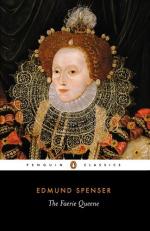332. GREAT GORGON, Demogorgon, whose name might not be uttered, a magician who had power over the spirits of the lower world. The poet is here imitating the Latin poets Lucan and Statius.
333. COCYTUS, the river of wailing, and STYX, the river of hate, both in Hades. There were two others, Acheron, the river of sorrow, and Phlegethon, the river of fire.
335. LEGIONS OF SPRIGHTS. In this stanza and the preceding Spenser follows Tasso’s Jerusalem Delivered, xiii, 6-11, where the magician Ismeno, guarding the Enchanted Wood, conjures “legions of devils” with the “mighty name” (l. 332).
339. CHOSE. Imitation of Ariosto’s Orlando Furioso, ii, 15, in which a false spirit is called up by a hypocritical hermit. The description of the House of Sleep in st. xxxix seq. is modelled on the same poet, Orlando Furioso, ii, 15 seq. The influence of Homer’s Odyssey, xi, 16 is seen in st. xxxix, ll. 348 seq.
348. TETHYS, the ocean. In classical mythology she is the daughter of Uranus (heaven) and Gaea (earth), and the wife of Oceanus.
349. CYNTHIA, the moon. The allusion is to the story of Diana and Endymion. See Lyly’s play Endymion.
352. WHOSE DOUBLE GATES. Homer, Odyssey, xix, 562, and Vergil, Aeneid, vi, 893, give the House of Dreams a horn and an ivory gate. Spenser substitutes silver for horn, mirrors being overlaid with silver in his time. From the ivory gate issued false dreams; from the other, true ones.
361. SLUMBER SOFT. This stanza shows Spenser’s wonderful technique. His exquisite effects are produced, it will be noticed, partly by the choice of musical words and partly by the rhythmical cadence of the verse phrases. It is an example of perfect “keeping,” or adaptation of sound to sense. Cf. Chaucer’s description of the waterfalls in the Cave of Sleep in his Boke of the Duchesse, 162.
376. WHOSE DRYER BRAINE, whose brain too dry. In the old physiology, a dry brain was the cause of slow and weak perception, and a moist brain of quickness.
378. ALL, entirely, altogether.
381. HECATE, queen of phantoms and demons in Hades, and mistress of witches on earth. See xxxvii.
387. THE SLEEPERS SENT, the sleeper’s sense.
405. MOST LIKE TO SEEME, etc.. most likely fit to seem for (represent) Una. Like is an adv. A very awkward inversion.
411. BORNE WITHOUT HER DEW, i.e. created by him in an unnatural manner.
425. FAYRE VENUS, the daughter of Jupiter, or Zeus, and the sea-nymph Dione. She is the same as Aphrodite, the Greek goddess of love and beauty.
430. THE GRACES, Euphrosyne, Aglaia, and Thalia, daughters of Zeus and Aphrodite.
431. HYMEN IO HYMEN, refrain of an old Roman nuptial song. Hymen, the son of Apollo and the Muse Urania, was the god of marriage.




